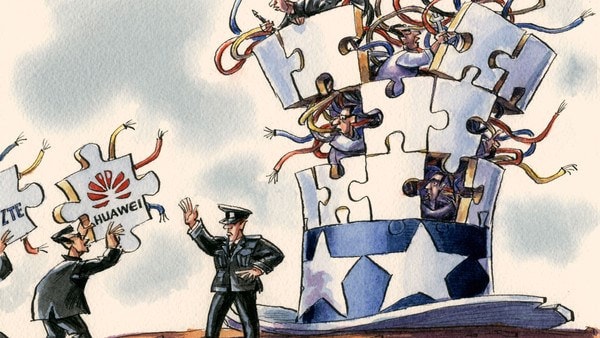The US market is closed to Chinese technology companies.
After two years of fighting accusations of spying on the US, Huawei CEO Ren Zhengfei said the company has officially abandoned the US market.
 |
Huawei leaves the US
Speaking to Les Echos, the CEO said that China's leading telecommunications equipment company Huawei will leave the US market. Huawei's crisis in the US has its roots in Mr. Ren's background. Mr. Ren Zhengfei was an officer of the Chinese People's Army (PLA) before founding Huawei. On the other hand, this story also signals the marketing difficulties of Chinese companies when entering the US market.
Over the past two years, US politicians, including the House Intelligence Committee, have accused Huawei of spying for the Chinese government.
Mr. Nham explained to Les Echos: "If Huawei hinders US-China relations, we will leave the US market."
Huawei denies all espionage allegations, and the White House has also declared Huawei innocent, as they have been unable to find evidence that the company spied on the United States.
Chinese companies face difficulties when going abroad
The suspicions about Huawei are largely related to Mr. Ren’s past. But Chinese technology companies are also facing public suspicion. Suspicion of China is so strong that Americans need to know if a company is linked to the Chinese government. Whenever a Chinese company ships a product to the United States, Americans wonder, “Is there spying in that product?” or “Can my data be read by the Chinese government?”
Tencent, China’s leading internet company, is also in the spotlight of the American media. Tencent recently became a major investor in Snapchat and is the model that Snapchat founder Evan Spiegel aims for. Previously, Tencent’s free messaging app WeChat also encountered many difficulties when attacking foreign markets.
One of WeChat’s biggest media crises was when the app was discovered to be blocking some “sensitive” words to the Chinese government. Tencent strongly defended that these were “technical errors” and denied that the company censored words under the direction of the Chinese government. In Vietnam, readers must remember the WeChat “cow tongue line” scandal shown on the app’s map – a serious violation of our country’s national sovereignty.
WeChat is not only facing boycotts in the US and Vietnam, especially in places with unfriendly relations with the Chinese government. In Taiwan, the leader of the main opposition party, the Democratic Progressive Party, has warned that the app could pose security risks. The Indian intelligence agency has also proposed a ban on WeChat because of suspicions that the app is a spy tool for China.
Chinese people are more careful about their image.
Because of these difficulties, smaller Chinese tech companies are very cautious when entering new markets, to avoid facing serious problems like those of Huawei or Tencent.
One of China’s leading phone makers, Xiaomi, is treading carefully with the security allegations against it, as it faces challenges as it moves into the global market. Xiaomi has been doing well in China, even surpassing Apple’s market share there in the second quarter, just three years after its founding. But Xiaomi has only recently come to the attention of Americans, with the arrival of Google’s Android vice president, Hugo Barra.
Barra was tasked with overseeing Xiaomi’s international operations and was trying to help the company achieve what no other Chinese phone company had achieved: Gaining brand recognition on par with rivals like Apple, Samsung, or Sony. In fact, Huawei is the world’s third-largest smartphone maker, behind Apple and Samsung, but it has only 5% market share, far behind the two rivals and closely followed by the ones below.
In China, Xiaomi’s success is partly due to the celebrity of its co-founder and CEO, Lei Jun. But in the American media, Lei is seen as a Chinese version of Steve Jobs. And Lei has never disputed the comparison. “Apple doesn’t really care what users want. They imagine what users want,” Lei told CNN.
But it’s also worth noting that Chinese companies are more willing to innovate and are no longer just suppliers of cheap labor. For example, the Tencent-Zynga business model is being applied to Snapchat (Zynga has been working with Tencent since 2011, when it released the Chinese version of Cityville).
Glow co-founder Mike Huang says his company no longer sees China as a giant outsourcing factory.
“Chinese engineers are very good. The only thing they need is more experience to break through in thinking. But that is also happening very quickly.”
Despite such evaluations, Chinese technology companies are still facing a wave of suspicion from the world. Especially in the context of electronic warfare being increasingly valued by governments and conflicts of interest and border disputes between China and many countries.
According to PLXH






